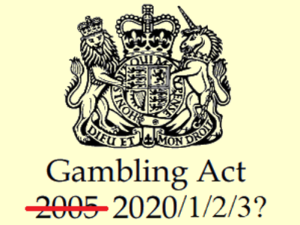AutoPlay & QuickSpin Features Banned From Online Slots In The UK From October
 The United Kingdom Gambling Commission has announced a new package of ‘strict measures’ that will come in in order to add protection to customers that use online slot games. One of the major measures includes an instruction to ‘slow down’ how quickly people can play games on online slot machines, with such features as AutoPlay and QuickSpin seen as something that can cause players to lose track of their spending.
The United Kingdom Gambling Commission has announced a new package of ‘strict measures’ that will come in in order to add protection to customers that use online slot games. One of the major measures includes an instruction to ‘slow down’ how quickly people can play games on online slot machines, with such features as AutoPlay and QuickSpin seen as something that can cause players to lose track of their spending.
The UKGC wants the industry to introduce a gap of at least two and a half seconds between spins, essentially killing off the QuickSpin feature. The Gambling Commission also wants the AutoPlay feature, which allows punters to set the slot to spin on its own numerous times, to be removed. These are wide-ranging overhauls that will almost certainly reduce the £2.2 billion a year that the industry makes from online slots.
As part of the new announcement customers sounds and features will also be moderated to ensure losing spins are not displayed in a way that could give the illusion that the customer has won. Users will also be shown their session time, loses and winnings after each game. The UKGC also confirmed that the ban on reverse withdrawals, brought in as part of emergency measures in 2020 to deal with problem gambling during the corona virus pandemic, will also now be made permanent. These changes will come into effect on the 31st October 2021 giving operators and game developers just over 9 months to adapt.
Why The Measures Are Being Introduced
 There has been a fear within the gambling industry that online slots would be targeted by the government ever since the decision was taken to reduce the maximum stake on Fixed Odds Betting Terminals to £2. That only affected machines that were found in shops, whereas the online versions of the same games had no such limitations in place. Now it appears that a move has indeed been made against online slot gaming.
There has been a fear within the gambling industry that online slots would be targeted by the government ever since the decision was taken to reduce the maximum stake on Fixed Odds Betting Terminals to £2. That only affected machines that were found in shops, whereas the online versions of the same games had no such limitations in place. Now it appears that a move has indeed been made against online slot gaming.
The main aim of the UKGC is to reduce any sense of risk to players, with the Gambling Commission’s Chief Executive Officer, Neil McArthur, saying,
“The evidence shows that these features increase the risk of harm to customers.” That is the crux of the matter, with Sports Minister Nigel Huddleston confirming as much when he said, “Today’s steps will help curb the intensity of online gambling, introducing greater protections that will reduce the risk of gambling related harm.”
What Are The New Rules
 Whilst the decision to remove the AutoPlay and QuickSpin features are headline grabbing, there are other curbs that are also being introduced to slot machines. For starters, slot machines will no longer be allowed to play positive-sounding music or noises at times when a player has lost money. This is part of a phenomenon called ‘losses disguised as wins’, where players are being tricked into thinking the outcome has been positive.
Whilst the decision to remove the AutoPlay and QuickSpin features are headline grabbing, there are other curbs that are also being introduced to slot machines. For starters, slot machines will no longer be allowed to play positive-sounding music or noises at times when a player has lost money. This is part of a phenomenon called ‘losses disguised as wins’, where players are being tricked into thinking the outcome has been positive.
Also on the list of curbs that need to be introduced is removing a sense that players are ‘in control’ of the outcome of a fame when in actuality the ultimate outcome is decided by a Random Number Generator. On top of that, the ‘reverse withdrawal’ feature will have to be removed from accounts, meaning that punters will no longer be able to ask for a withdrawal of money and then change their minds. Reverse withdrawals were already been banned since the summer of 2020 when they were temporarily removed as part of emergency lockdown measures. As excepted this move has now been made permanently.
Whilst all of the above measures are likely to limit the amount of money that bettors spend on online slots, perhaps the biggest change will come in the form of operators needing to clearly display both the amount of time a player has been playing online slots for as well as the amount of money that they’ve won or lost during that time. That will clearly spell out to players how much money they’re losing over a given period of time.
What Will The Effects Be?
 The main motivation behind these changes is to reduce problem gambling and harm caused by gambling. The idea is people will be less able to gamble mindlessly by having to physically click each time they spin, they will also have to wait at least 2.5 seconds each time creating time to think. The slots themselves will also be more transparent by not giving the illusion of winning when you are not or the idea that you are in control of the outcome.
The main motivation behind these changes is to reduce problem gambling and harm caused by gambling. The idea is people will be less able to gamble mindlessly by having to physically click each time they spin, they will also have to wait at least 2.5 seconds each time creating time to think. The slots themselves will also be more transparent by not giving the illusion of winning when you are not or the idea that you are in control of the outcome.
With users also being shown a summary of the session time, winnings and loses after each game it is hoped that this information will cause people to reflect more on their gaming behaviour. Removing reverse withdrawals will also stop people impulsively reversing a withdrawal to gamble more, which is known to affect problem gamblers more than others.
The overall effect will be sessions will become shorter, spin rate will decrease and people may generally spend less time playing online slots. This will of course hit the casino operators in the pocket but at the same time it should mean that more people are able to enjoy games online without falling into addition. For a typical player who spends 10 minutes or less playing slots in a session the effect will be relatively minor.
Changes In Place By October
 The Gambling Commission has informed online casino operators that the measures will take effect from the 31st of October this year. Whilst that only gives them nine months to change the way the various slot games operate, it will still ensure that they can earn plenty of money in the meantime. Data from the UKGC shows that slot players spent £67 per month on average, compared to £45 for event betting and £36 on other casino products.
The Gambling Commission has informed online casino operators that the measures will take effect from the 31st of October this year. Whilst that only gives them nine months to change the way the various slot games operate, it will still ensure that they can earn plenty of money in the meantime. Data from the UKGC shows that slot players spent £67 per month on average, compared to £45 for event betting and £36 on other casino products.
Online casino revenue has been driven by the growth of online slots. The online revenue in the year up to March of 2016 was £2.36 billion, whereas in the year to March 2020 that had increased to around £3.18 billion. When you consider that slot machines makes up about 70% of that income, you can see just how lucrative slot gaming is to betting companies and how much they depend on the games for their profits.
It Comes As The Government Considers A Review
 The move from the Gambling Commission to curb the influence of online slot games comes at a time when the government is carrying out a wide-ranging review of the United Kingdom’s gambling laws. The review was launched in December last year, with the hope of critics of betting laws in the UK being that it will roll back lots of problems encountered with the Gambling Act of 2005.
The move from the Gambling Commission to curb the influence of online slot games comes at a time when the government is carrying out a wide-ranging review of the United Kingdom’s gambling laws. The review was launched in December last year, with the hope of critics of betting laws in the UK being that it will roll back lots of problems encountered with the Gambling Act of 2005.
At the time of the announcement of the review and the government’s call for evidence, it was felt that changes would include the likes of tougher affordability checks, a mandatory levy to help fund addiction treatment and a look at online slot games. The 2005 Act has been referred to as an analogue act for a digital age, with online casinos barely having taken off when the various parts of the Act were written.
This is, therefore, a long-needed review of the manner in which the Act handles online gambling. Online slot machines have been in the cross-hairs of the Gambling Commission ever since the review was confirmed, so it’s hardly going to be a surprise to the industry that such changes are coming into play. The desire to offer more protections to punters has been clear from the outset of the UKGC’s look at the industry.
The Department for Digital, Culture, Media and Sport has approved these new controls, praising the Gambling Commission’s actions. Huddleston said,
“I welcome the Gambling Commission’s tough measures as we continue our comprehensive review of gambling laws to make sure they’re fit for the digital age.”
It’s likely that more changes are also still to come, including an improvement of ‘customer interactions’ in addition to simply asking for player verification and the need to provide identification. The issue of stake limits for online slots is also due to be addressed.
Why The New Rules Now?
 Given there is a gambling review on the horizon it is worth asking why the UKGC has announced these changes now and has not just waited for the result of the review and enacted all changed together?
Given there is a gambling review on the horizon it is worth asking why the UKGC has announced these changes now and has not just waited for the result of the review and enacted all changed together?
The answer is partly that regulators need to be seen to be implementing changes immediately in response to calls that online gambling addiction needs to be tackled with urgency and cannot wait for the result of a review. This had of course been heightened over the last year during lockdowns caused by coronavirus.
The other reason is that the UKGC wants to be seen to be flexing some muscle. Despite issuing record fines over the past few years and implementing a lot of changes around verification, monitoring of customers and a credit card ban, the body has still come under intense criticism. Some have called for the Commission to be scrapped entirely, especially after it was announced that the dramatically underfunded body was making job cuts.
By issuing these changes before a review the UKGC is trying to improve its image as a body that can tackle problem gambling in a £15 billion industry.



